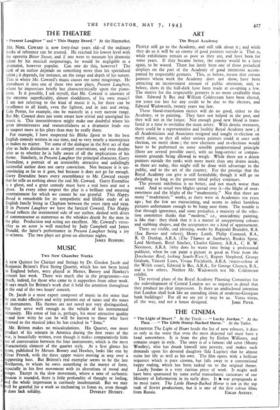" Present Laughter " and " This Happy Breed." At
the Haymarket.
THE THEATRE
MR. NOEL COWARD is now forty-four years old—if the ordinary books of reference can be trusted. He reached his lowest level with the operetta Bitter Sweet, and if one were to measure his dramatic talent by his musical outpourings, he would be negligible as a dramatist, however popular. Can one do this, however? The rank of an author depends on something more than his specialised talent ; it depends, for instance, on the range and depth of his nature. This is where Mr. Coward's music causes me some misgivings. He introduces it into one of these two new plays, Present Laughter, where he improvises briefly but characteristically upon the piano- forte. Is it possible, I ask myself, that Mr. Coward is unaware of the extreme superficiality, almost shoddiness, of his own music? I am not referring to the kind of music it is, for there can be excellence in all kinds, even the lightest, and in jazz and swing. Cole Porter, for example, can be masterly in a very narrow range. But Mr. Coward does not seem aware how- trivial and unoriginal his music is. This insensitiveness might make one doubtful where his great inventiveness and resourcefulness as a dramatist leads one to suspect more in his plays than may be really there.
For example, I have suspected his Blithe Spirit to be the best English comedy written in our time, and so very nearly a masterpiece as makes no matter. Yet some of the dialogue in the first act of that play so lacks distinction as to compel reservations, and even doubts arise as to whether he is fully aware of all the implications of his theme. Similarly, in Present Laughter the principal character, Garry Essendine, a portrait of an irresistibly attractive and unfailingly successful author does not carry conviction. Not because it is un- convincing as far as it goes, but because it does not go far enough. Garry Essendine bears every resemblance to Mr. Coward except that he tells us nothing about the real Mr. Coward. Garry Essendine is a ghost, and a great comedy must have a real hero and not a ghost. In every other respect the play is a brilliant and amusing entertainment for which we cannot be too grateful. This Happy Breed is remarkable for its sympathetic and lifelike study of an English family living in Clapham between the years 19X9 and x939. If in Present Laughter we have the farcical Coward, This Happy Breed reflects the sentimental side of our author, dashed with doses of commonsense as numerous as the whiskies drunk by the men in the play. Production and acting are excellent. Mr. Coward's versa- tility as an actor is well matched by Judy Campbell and James Donald, the latter's performance in Present Laughter being a joy to witness. The two plays are given on alternate nights.
JAMES REDFERN.


























 Previous page
Previous page